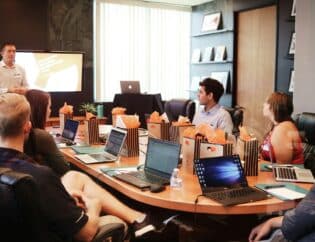There has been much research into the subject of productivity over the years. Interruptions are constant foes to increased productivity, especially avoidable ones. Multiple studies put the average amount of time after an interruption until an employee can re-focus on the task at hand as being over 23 minutes. In today’s fast-paced, multitasking, and always-connected world there are more interruptions than ever before. But fear not because there are proven strategies to better dealing with interruptions or preventing them all together. Read on to learn more about better handling interruptions so you can get more work done.
Before looking at specific strategies to handle interruptions it is a good idea to “survey the damage” by tracking for a period of time how often you are distracted. Start a log on some paper or start keeping notes in a file on your computer of every time you are distracted. Keep important information such as 1) when the distraction occurred, 2) who/what caused it, 3) how much time was lost, and 4) how urgent was the distraction. Truly understanding this information and more about interruptions and distractions is important to knowing how to deal with them.
Most people will find that they are their biggest cause of distraction. Employees frequently interrupt their work to check email unnecessarily, scroll through social media, get coffee too often (and probably drink it too much too, but that’s a whole other issue), and checking the clock to see how much time has passed since the last time they checked the clock. The good news for people who find that they are the causes of their own interruptions is that they also have the power to prevent most distractions fairly easily. If possible, turn off notification sights and sounds related to email, chat, cell phone, etc, or at the very least reduce the intrusiveness of notifications.
Focus on the “why” you are doing a task at work. Not all tasks are the most exciting, but regardless of excitement, psychologists point to focusing on the “why” or underlying objective of a task to motivate employees to get it done faster without being interrupted. If you don’t know the answers to these questions regarding a given task, now is a good time to ask or research the answers yourself. Setting up goals or rewards for yourself can also help incentivize yourself to avoid interruptions and focus on completing the task at hand. Lastly, focus on one task at a time because most experts agree that multitasking does not help employees get more work done and frequently leads to increased interruptions.
Before looking at specific strategies to handle interruptions it is a good idea to “survey the damage” by tracking for a period of time how often you are distracted. Start a log on some paper or start keeping notes in a file on your computer of every time you are distracted. Keep important information such as 1) when the distraction occurred, 2) who/what caused it, 3) how much time was lost, and 4) how urgent was the distraction. Truly understanding this information and more about interruptions and distractions is important to knowing how to deal with them.
Most people will find that they are their biggest cause of distraction. Employees frequently interrupt their work to check email unnecessarily, scroll through social media, get coffee too often (and probably drink it too much too, but that’s a whole other issue), and checking the clock to see how much time has passed since the last time they checked the clock. The good news for people who find that they are the causes of their own interruptions is that they also have the power to prevent most distractions fairly easily. If possible, turn off notification sights and sounds related to email, chat, cell phone, etc, or at the very least reduce the intrusiveness of notifications.
Focus on the “why” you are doing a task at work. Not all tasks are the most exciting, but regardless of excitement, psychologists point to focusing on the “why” or underlying objective of a task to motivate employees to get it done faster without being interrupted. If you don’t know the answers to these questions regarding a given task, now is a good time to ask or research the answers yourself. Setting up goals or rewards for yourself can also help incentivize yourself to avoid interruptions and focus on completing the task at hand. Lastly, focus on one task at a time because most experts agree that multitasking does not help employees get more work done and frequently leads to increased interruptions.







